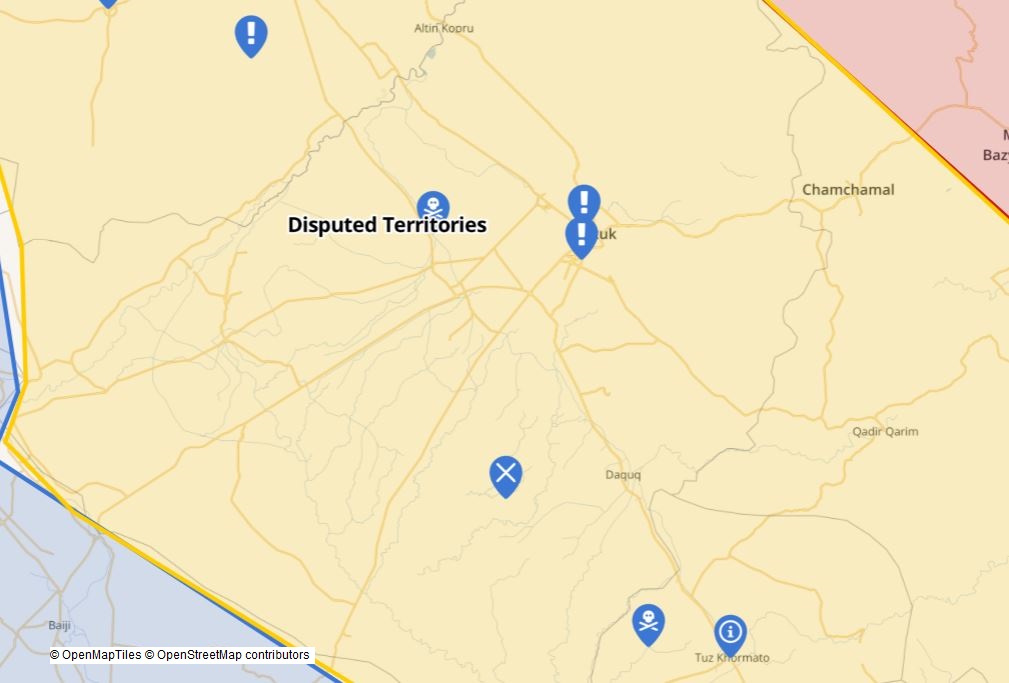1.1K
A weekly brief of events and news occurred in the disputed territories.
Kirkuk
- The National Security Directorate in Kirkuk prevented Ali al-Bayati, a member of the High Commission for Human Rights, from inspecting its prison. In a statement, al-Bayati said his visit was after a torture allegation by a former prisoner in Kirkuk.
- On Wednesday, July 7th, a number of non-Kirkuki Arabs attempted to occupy a Kurdish village near Sargaran Sub-district. The occupiers had a memorandum signed by the acting Arab Governor Rakan Saed, permitting their act, but the Kurdish villagers prevented the takeover. After the incident, the police intervened, but the issue remained unsolved. The Arabization policies have restarted across the disputed territories since October 16, 2017.
- Severe power shortages hit across Iraq, after ISIS (Dae’sh) targeted tens of towers with IEDs. Between June 30th and July 4th, several towers were down between Nineveh, Saladin and Kirkuk provinces, causing three power production stations to shut down in Kirkuk. Further, on Monday, July 5th, Da’esh terrorists blew up three more towers near the Rashad sub-district. Da’esh terrorists also shelled the North Gas Company (NGC) with rockets, the NGC produces gas used for power generation. According to a statement by NGC, the attack did not result in the loss of life or material damages. Meanwhile, the security forces announced the finding of three Da’esh hideouts between Hawija and Daquq district, an area that saw constant terror attacks in recent weeks. The security situation in Kirkuk continues to deteriorate; a process started when Iranian-backed militias and Iraqi forces removed the Kurdish Peshmerga from the disputed territories in October of 2017.
- On Wednesday, July 7th, the local police reported the seizure of 25 fuel tankers smuggled from the Department of Petroleum to a privately owned gas station. For weeks, Kirkuk has been suffering from a fuel crisis alongside other essential services.
Khanaqin
- After widespread anti-government protests, the mayor’s office and protestors reached a ten-point agreement providing that the government provide more electricity and water. The anti-government demonstrations shut down the international road between Iraq and Iran due to a lack of essential services, mainly electricity and water.
- Da’esh terrorists ambushed and killed five civilians, three Kurds and two Arabs, attempting to free four kidnapped Kurdish farmers near Jalawla (Golala) on Sunday. Two kidnapped farmers fled, but Da’esh terrorists drove the other two to an unknown area.
- In a press conference, several civilian activists and public figures called to reduce the election campaign period from one month to ten days due to security, political, and service situations in the area. Iraq is set to hold its parliamentary election on October 10th of this year.
Tuz Khurmatu
- Da’esh launched several new attacks near Tuz Khurmatu, including Saturday, July 3rd on an Iraqi Army checkpoint resulting in the death of on soldier and two more others wounded. Furthermore, Da’esh also clashed with the federal police near the Tuz Khurmatu Air Base, killing two and wounding five more.
- The Turkish-backed, Iraqi Turkman Front warned about the lack of basic service in the town, accusing the Saladin administration of “neglecting” Tuz Khurmatu. The Turkmen Front called for immediate intervention and solving the issues of the city.
Makhmour
- On Monday, July 5th, several civilian activists protested in front of the town’s management for the deterioration of basic services in the area. The activists gave a five day time limit to fix the issues, or larger protests will begin.

